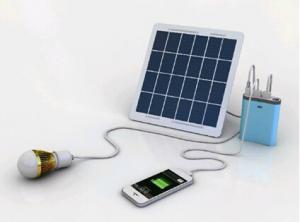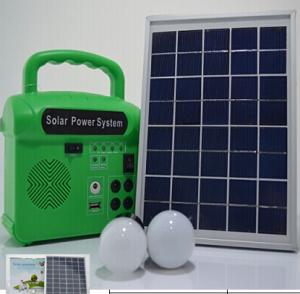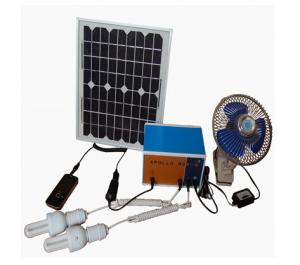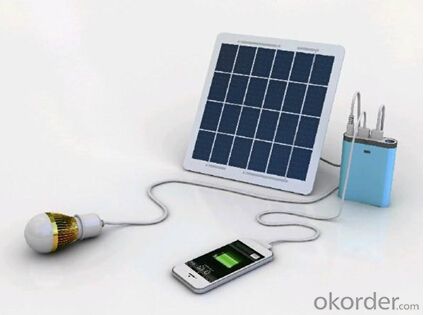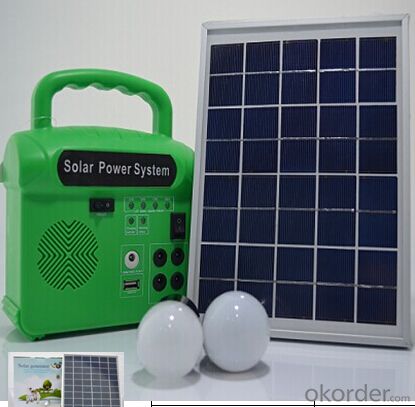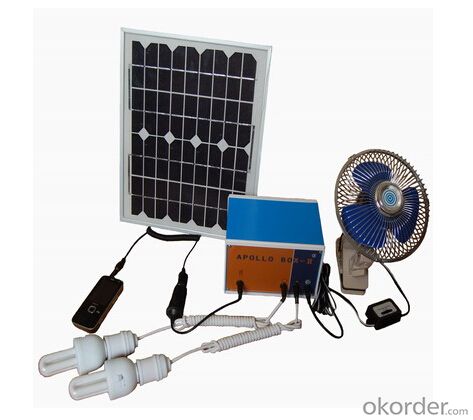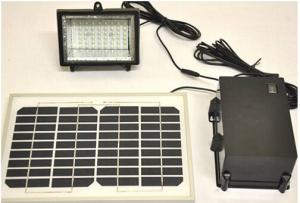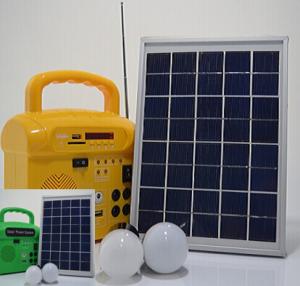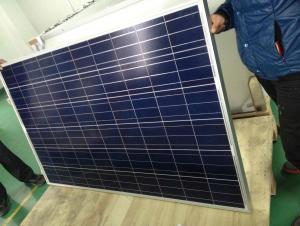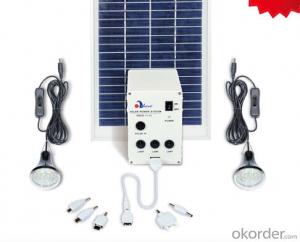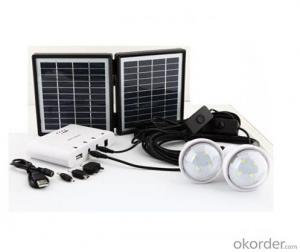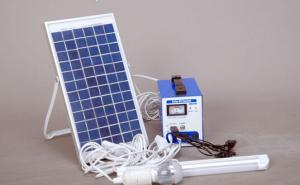Solar Energy Systems for Sale - CNBM Solar Home System Roof System Capacity-50w
- Loading Port:
- Shanghai
- Payment Terms:
- TT or LC
- Min Order Qty:
- 500 set
- Supply Capability:
- 10000 set/month
OKorder Service Pledge
OKorder Financial Service
You Might Also Like
Introduction of our company
We are the first solar racking system developer in China, who committed to solar racking system R&D, producing and marketing for about 10 years. We were the OEM for Sunpower, and are one of the largest rooftop solar racking system supplier in Japan and Australia now.
We are persisting the path of specialization, scale and internationalization development. We have been imported the international advanced technology equipment for manufacturing , assembling and testing. Frontier solar racking system is with own patents. The dynamic wind resistance reliability of our racking system can up to 270km/h. Therefore, superior product quality with more than 25 years' durability and perfect after-sale service have earned us a high reputation in PV industry worldwide.

Working Principle of Solar Roof System
The stand alone Solar Home System is an off-grid solar system which uses batteries to store the solar energy. Stand alone solar system solutions design for those who are not able or willing to connect to electricity grid.
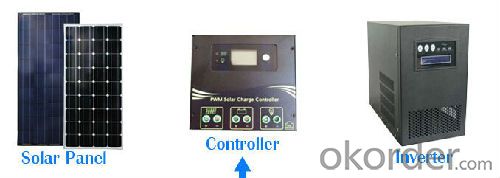
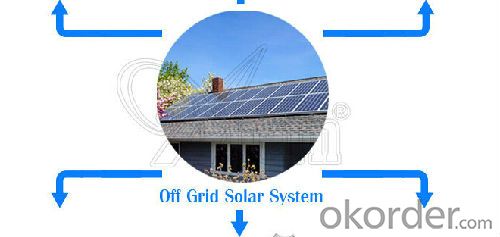

Specification of Solar Home System
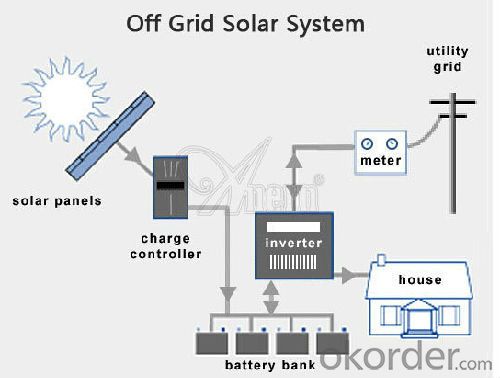
Product Features of Solar Home System
Off grid solar power system is mainly used for application with relatively-small power consumption, and the areas have no grid network coverage, or grid power is unstable or outage condition.
It’s composed of solar panels, hybrid solar inverter, battery bank, solar panel mounting racks, and other accessories required fora complete home solar power system.
The battery bank gives a stable power output to the solar inverter which converts DC to AC to power loads, and provides power backup in rainy or cloudy days.
The solar panels generate electricity at daytime and charge the battery bank.
The off grid home solar power system provides grid power bypass in case of battery power shortage when sunshine is not enough.
All the off grid home solar power system configurations are worked out by scientific calculation and design.
Advantage of Our Solar Home System
1. solar power system operation can automatically control and manual control modes.
2. Easy installation, energy saving (saving coal and petroleum resources, reduce pollution / noise emissions); do not need to lay long-distance transmission lines, do not build large substation, system stability, less maintenance, low maintenance cost, daily / each month / year electricity clearly visible, and can be entered into the computer record.
This solar system configuration is for reference. It can be adjusted based on actual condition and requirement. All parts have been tested and proven in actual operation with enough reliability and stability. It’s suggested to source whole system as a pack from us to guarantee the system compatibility.
Terms and Conditions
1. Trade terms: FOB Shanghai
2. Payment terms: 30% T/T, balanced before shipment/ LC at sight before shipment. Actual Terms can be negotiated for big order.
3. Package: Exported standard package suitable for tough handling and sea transport.
4. Delivery: Goods to be ready within 10~30 days depending on order quantity.
5. Warranty: 10 years for solar panel, 2 years for controller/inverter/battery.
FAQ
Q1. Can we design packaging?
Yes, but there is with quantity limitation. For 10,000 pcs, we will make the packing free for the client, and if less than 10,000 pcs, we can talk, the package is free or little money will be charged.
Q2. Can we add our logo on products?
Yes, there are several ways to do this. We can put the label of your logo on the products or make the silk print of your logo on the products. It is free.
Q3. can we customize product?
OEM and ODM are welcomed from Anern. We have rich experiences in this area.
Q4. What is your company return policy?
If we Anern breaks the contract of any agreement on price, quality and any other terms and conditions on the contract, the buyer can return the goods back to us and we will send the money back to buyers. Force majeure and god act are excepted.
Q5. What is your main product line is made?
LED street light and solar street lighting system, LED high bay light, LED flood light, LED tube light, bulb light, panel light, ceiling and down lights, all kinds of indoor lighting and outdoor lighting are available.
Q6.If I have a question I would like advice on how to contact you?
The best way is by e-mail. Tel, wechat, whatsapp, skype, contact us on our website online service worker are good ways to reach us also.
Q7. What will you provide services?
Solution providing, engineering, system design, best products suggestion, quality control, delivery, after sale service and many others. You can get our feedback during 24 hours.
- Q: Can a solar energy system be installed on a roof?
- Yes, a solar energy system can be installed on a roof. In fact, rooftops are one of the most common locations for solar panel installations.
- Q: How do solar energy systems impact energy resilience during natural disasters?
- Solar energy systems can significantly enhance energy resilience during natural disasters. These systems provide a reliable and independent source of electricity, enabling critical infrastructure and essential services to continue functioning even when the main power grid is disrupted. Solar panels can continue generating electricity as long as there is sunlight available, reducing the reliance on fuel-dependent generators and minimizing the risk of fuel shortages during emergencies. Additionally, solar energy systems can be paired with battery storage, allowing excess energy to be stored and used during nighttime or cloudy periods. This combination ensures a continuous power supply, enabling emergency response efforts, communication networks, and healthcare facilities to operate, thereby enhancing overall energy resilience during natural disasters.
- Q: Can solar energy systems be used for heating swimming pools?
- Yes, solar energy systems can be used for heating swimming pools. Solar pool heating systems use energy from the sun to heat the water in the pool, reducing the need for conventional heating methods and saving energy costs.
- Q: How does the installation of solar panels affect the roof's warranty?
- The installation of solar panels typically does not void the roof's warranty. However, it is important to consult with the roofing manufacturer and installer to ensure that the installation process does not breach any warranty conditions.
- Q: Can solar energy systems be used in powering agricultural irrigation systems?
- Yes, solar energy systems can be used to power agricultural irrigation systems. Solar energy can be harnessed through photovoltaic panels or solar thermal systems to generate electricity or heat, respectively. This energy can then be utilized to power pumps, motors, and other components necessary for irrigation, reducing the reliance on grid electricity or diesel generators. Solar-powered irrigation systems are sustainable, cost-effective, and can be particularly beneficial in remote or off-grid agricultural areas.
- Q: Can a solar energy system be used to heat water?
- Yes, a solar energy system can be used to heat water. Solar water heating systems use the sun's energy to heat water through collectors, which are typically installed on the roof. These collectors absorb sunlight and transfer its heat to a fluid, such as water or antifreeze, which is then circulated through pipes to heat water for domestic or commercial use. This process is efficient and environmentally friendly, making solar water heating a popular choice for reducing energy consumption and costs.
- Q: Can solar energy systems be installed in areas with extreme weather conditions?
- Yes, solar energy systems can be installed in areas with extreme weather conditions. However, the performance and durability of the system may vary depending on the specific weather conditions. Proper design, installation, and maintenance can help ensure that solar systems can withstand extreme weather events such as hurricanes, snowstorms, or high winds. Additionally, advancements in solar technology have made it possible to adapt systems to various weather conditions, making solar energy a viable option in areas with extreme weather.
- Q: Can a solar energy system increase the value of my home?
- Yes, a solar energy system can increase the value of your home. Studies have shown that homes with solar panels tend to sell for a higher price and have a faster selling time compared to homes without solar. This is because solar energy systems offer long-term cost savings on electricity bills and are seen as environmentally friendly, which appeals to homebuyers who are increasingly interested in sustainable and energy-efficient features. Additionally, some states offer incentives and tax credits for homeowners with solar, further adding to the financial benefits.
- Q: What is a photovoltaic (PV) system?
- A photovoltaic (PV) system is a technology that converts sunlight into electricity using solar panels made up of photovoltaic cells. These cells generate a direct current (DC) electrical current when exposed to sunlight, which is then converted into alternating current (AC) by an inverter for use in homes, buildings, or the power grid. PV systems are a clean and renewable energy source that can be used for various applications, from powering individual devices to supplying electricity for entire communities.
- Q: Can solar energy systems be used in areas with high levels of hail or other severe weather conditions?
- Yes, solar energy systems can be used in areas with high levels of hail or other severe weather conditions. However, it is important to select appropriate materials and design the system to withstand these conditions. For instance, using hail-resistant panels, positioning them at an angle, and employing protective measures can help mitigate the potential damage caused by hail or severe weather. Proper maintenance and insurance coverage are also advisable to ensure the longevity and efficiency of the solar energy system in such areas.
Send your message to us
Solar Energy Systems for Sale - CNBM Solar Home System Roof System Capacity-50w
- Loading Port:
- Shanghai
- Payment Terms:
- TT or LC
- Min Order Qty:
- 500 set
- Supply Capability:
- 10000 set/month
OKorder Service Pledge
OKorder Financial Service
Similar products
Hot products
Hot Searches
Related keywords
